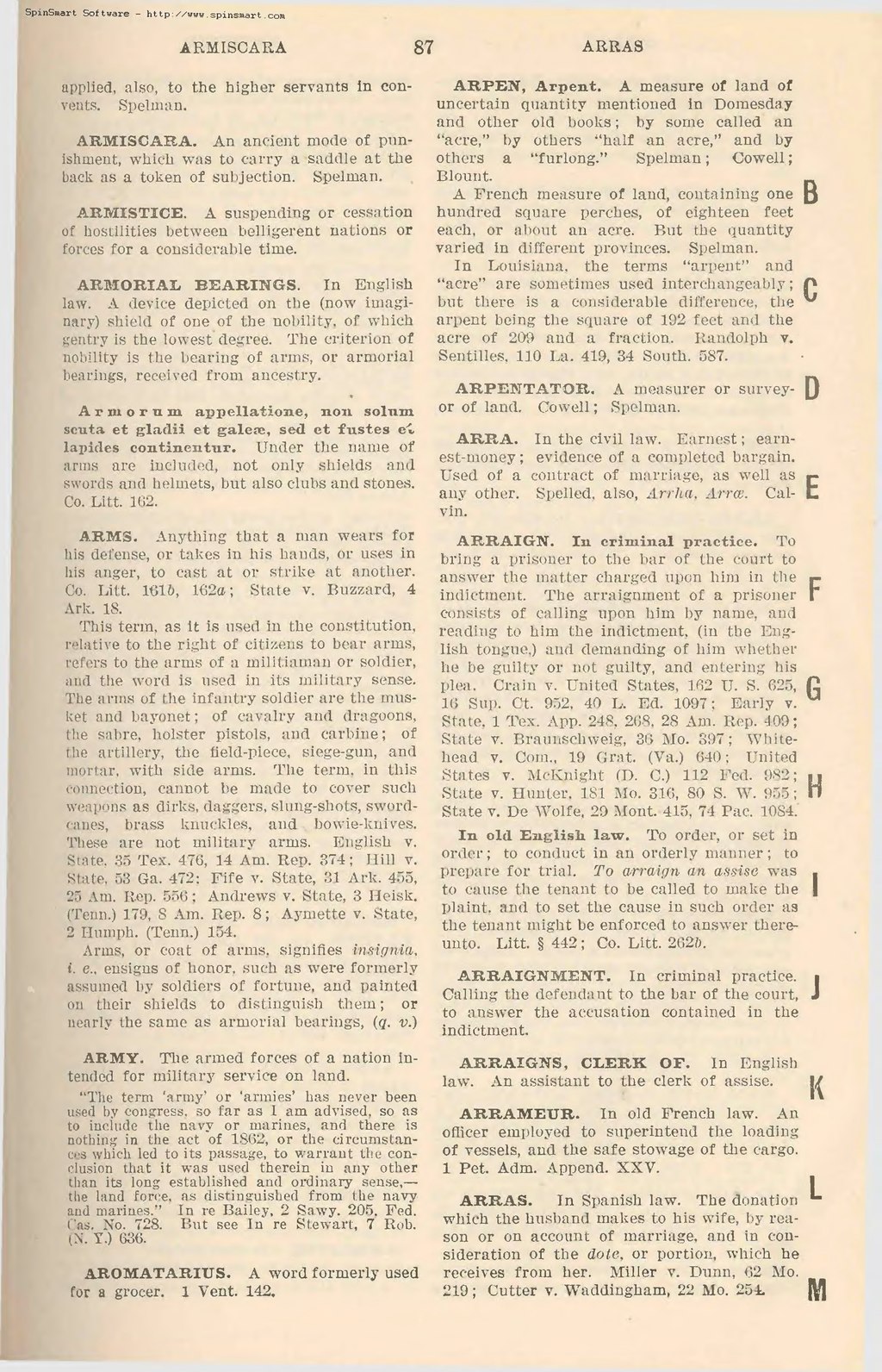applied, also, to the higher servants in convents. Spelman.
ARMISCARA. An ancient mode of punishment, which was to carry a saddle at the back as a token of subjection. Spelman.
ARMISTICE. A suspending or cessation of hostilities between belligerent nations or forces for a considerable time.
ARMORIAL BEARINGS. In English law. A device depicted on the (now imaginary) shield of one of the nobility, of which gentry is the lowest degree The criterion of nobility is the bearing of arms, or armorial bearings, received from ancestry.
Armorum appellatione, non solum scuta et gladii et galeæ, sed et fustes et lapides continentur. Under the mime of arms are included, not only shields and swords and helmets, but also clubs and stones. Co. Litt. 162.
ARMS. Anything that a man wears for his defense, or takes in his hands, or uses in his anger, to cast at or strike at another. Co. Litt. 1611), 162a; State v. Buzzard, 4 Ark. 18.
This term, as it is used in the constitution, relative to the right of citizens to bear arms, refers to the arms of a militiaman or soldier, and the word is used in its military sense. The arms of the infantry soldier are the milsi\l‘t and beyonet: of cm airy and dragoons, llie szihre. holster pistols, and carbine; of ihe artillery, the field-piece. siege-guu, and mortar, with side arms. The term, in this -,-uimection, cannot be made to cover such Wl‘1l|i(|I.lS as dirks. daggers, slung-sliots, sword- umes. brass knuckles, and bowie-knives. These are not military ai-ins. English V. State. 515 Tex 476. 14 Am. Rep. 37-1: Hill V. State 53 Ga. -172; Fife v. State, 31 Ark. 435. 2.‘. Am. Rep. 556; Andrews v. State, 3 Heisk. (i‘enn.) 179, 8 Am. Rep. 8; Ayniette v. State. 2 Hniiiph. (Tenn.) 154.
Arms, or coat of arms. signifies ins1'gm'a, i. e.. ensigns of honor. such as were formerly assumed by soldiers of fortune, and painted on their shields to distimuish them; or nearly the same as armorial hearings, ((1. 1).)
ARMY. The armed forces of a nation intended for military service on land.
"The term ‘array’ or ‘armies’ has never been used by congress, so far as I am advised. so as to include the navy or marines, and there is nothing in the act of 1362, or the circumstances which led to its passage, to warrant the cocnlusion that it was used (herein in any other iban its long established and ordinary sense.- ibe land force, as distinguished from the navy and marines." In re Bailey. 2 Sawy. 205. Fed.
l‘as. No. 7 But see In re Stewart, 7 Rob. i.\. Y.) 636.
AROMATARIUS. A word formerly used for a grocer. 1 Vent. 142.
ARPEN. Ax-pent. A measure of land of uncertain quantity meiitioued in Domesday and other old books; by some called an "acre." by others "half an acre." and by others a "fui-long." Speinian; Cowell; Blount.
A French measure of land. containing one hundred square perches, of eighteen feet each, or ahont an acre. But the quantity varied in different provinces. Spelman.
In Louisiana, the terms "ai-pent" and "acre" are sometimes used interchangeably; but there is a considerable difference, the arpent being the square of 192 feet and the acre of 203 and a fraction. Sentliles. 110 La. 419. 3-1 South. 587.
ARPENTATOR. A measurer or survey- or of laud. Cowell; Spelman.
AREA. In the civil law. Earnest; earnest-mouey; e\idence of a completed bargain. Used of a contract of marriage, as well as any other. Spelled. also, Ari-ha. Arne. Cal- Vin.
ARRAIGN. In criminal practice. To bring a prisoner to the bar of the court to answer the matter charged upon him in the indictment. The arraignment of a prisoner consists of calling upon him by name, and reading to him the indictment, (in the English tongue.) and demanding of him whether he be guilty or not guilty, and entering his plea. Crain v. United States, 162 U. S. 625, 16 Sup. Ct. 932. -10 L. Ed. 1037; Early v. State. 1 Tex. App. 248, 268. 28 Am. Rep. 403; State v. Bi-aiiuschweig, 36 M0. 397; White- head v. Cnm.. 19 Grat. (Va.) G-10; United States v. lliclinight (D. C.) 112 Fed. 9 State v. Hunter. 181 M0. 316. 80 S. W. .- 0, State v. De Wolfe. 29 lliont. 415, 74 Pac 1084.
In old English law. To order, or set in order; to conduct in an orderly manner; to prepare for trial. To orraign an assise was to cause the tenant to be called to make the plaint, and to set the cause in such order as the tenant might be enforced to answer there- unto. Litt. § 442; C0. Litt. 2t‘-2b.
ARRAIGNMENT. In criminal practice. Calling the defendant to the bar of the court, to answer the accusation contained in the indictment.
ARRAIGNS. CLERK 01‘. In English law. An assistant to the clerk of assise.
ARRAMEUR. In old French law. All officer employed to snperintend the loading of vessels, and the safe stowage of the cargo. 1 Pet. Adm. Append. XXV.
ARRAS. In Spanish law. The donation which the husband makes to his wife, by reason or on account of marriage, and in consideration of the date, or portion, which he receives from her. Miller v. Dunn, 452 Mo. 1219; Cutter v. Waddingham. 22 Mo. 2H.
Randolph V.
